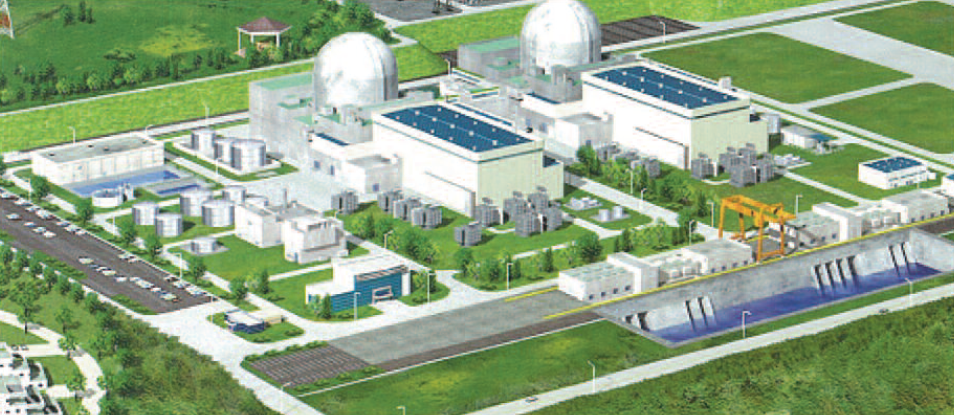A Busy Nuclear News Week
More than the usual number of nuclear energy-related news items have come to the fore this week, so we'll touch on each significant development and provide links for further reading.
French Regulator Approves Flamanville Vessel with Limits
The ongoing concern about carbon inclusions in reactor vessel components manufactured by Creusot Forge has now been partially resolved with French regulator Nuclear Safety Authority (ASN) signing off on the startup of the Flamanville EPR - but with some important stipulations.
ASN has ruled that the pressure vessel is safe to operate at the expected parameters of the EPR plant design, including design basis accidents. However, there is a fear that because of higher carbon inclusions that fracture toughness might reduce at a higher than normal rate. Because of this, extra periodic inspections are now to be performed. The reactor vessel head however cannot be inspected as easily, so since it appears to meet specifications now another head must be manufactured and will replace the original head in about seven years' time (the time it takes to order and manufacture one.) ASN feels that the original head will be adequate during this time period.
For full details on ASN's finding, click here.
KEPCO Moves In on Moorside, Halts at Shin-Kori

APR1400 units in an artist's conception; courtesy of KEPCO E&C
Although there's been speculation that South Korea was interested in jumping in on one or more of the UK new nuclear builds, this was confirmed this week when the Chief Nuclear Officer of KEPCO (the nationalized Korean utility, which owns the nuclear power construction business KHNP) not only said that the company was interested in buying into the Moorside project but that it would also intend to use its own APR1400 nuclear plant and cancel the Westinghouse AP1000 units originally planned.
The move did not surprise all analysts (this author included) but there was reported by the media some backlash from Westinghouse who pointed out that their design was already type approved in the UK. KEPCO on the other hand must still apply to certify the APR1400 unit in the UK, which it expects to do early next year, with a potential operation date in the 2027 - 2028 time frame, a few years later than the Westinghouse units had been planned for.
The KEPCO move would ostensibly bring along with it the other assets that have made the UAE's Barakah project successful - namely the experienced design and construction arms connected to the company. Westinghouse has announced that it will get out of the nuclear plant construction business, which is a major complication for the previously-scheduled UK Moorside project.
In a completely separate development KEPCO / KHNP have been ordered to halt construction work at the site of the latest APR1400 units, namely Shin-Kori 5 and 6, by Korea's newly-elected President. Moon Jae-In's anti-nuclear platform continued in motion as he announced that the plants would be subjected to a local referendum of sorts, and be fully analyzed for safety and cost before either going ahead or being cancelled. This process is expected to last about three months.
With Shin-Kori 5 and 6 about 28% complete, it's not inconceivable that, if the units are ultimately cancelled, some major components with long lead times from these projects could be diverted to a UK Moorside build, potentially speeding the project. This will all remain to be seen as the fate of such components and the units hangs on the Korean President's public referendum.
Cyber Attack Has No Nuclear Effect
Reports emerged from the Ukraine that the massive ransomware attack known as Petya had affected the automatic, remote radiation monitoring systems at the Chernobyl nuclear plant in the Ukraine. Today, SSE ChNPP (the official site operator) reports that while some systems were affected, the monitoring system inside the protective shelter for Unit 4 (which suffered the accident in 1986) was never affected. Further, manual radiological monitoring (which we would know here as surveys with radiacs on foot, radiation swipes, and portable air samples) was implemented during the period the system was down and no out of specification readings occurred. The plant's website and certain other functions were affected but all are again operating normally. Restoration of all site computer functions is underway, and there were no adverse or lasting effects caused by the ransomware attack.
 Will Davis is a member of the Board of Directors for the N/S Savannah Association, Inc. He is a consultant to the Global America Business Institute, a contributing author for Fuel Cycle Week, and he writes his own popular blog Atomic Power Review. Davis is also a consultant and writer for the American Nuclear Society, and serves on the ANS Communications Committee and the Book Publishing Committee. He is a former U.S. Navy reactor operator and served on SSBN-641, USS Simon Bolivar.
Will Davis is a member of the Board of Directors for the N/S Savannah Association, Inc. He is a consultant to the Global America Business Institute, a contributing author for Fuel Cycle Week, and he writes his own popular blog Atomic Power Review. Davis is also a consultant and writer for the American Nuclear Society, and serves on the ANS Communications Committee and the Book Publishing Committee. He is a former U.S. Navy reactor operator and served on SSBN-641, USS Simon Bolivar.

